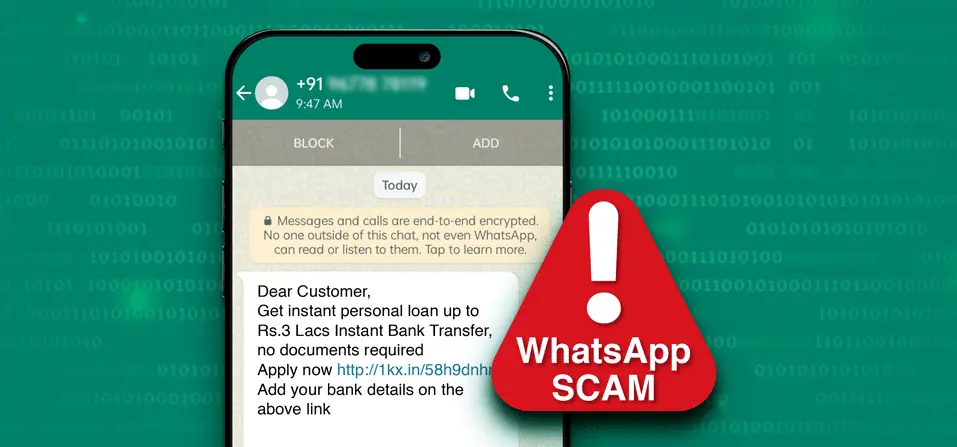- Blog

Messaging applications like WhatsApp have become double-edged swords in today’s world. While these apps help us stay in touch with family members, friends and business associates, it also enables fraudsters to scam people. Scammers send people messages on WhatsApp advertising fake loans with attractive interest rates and easy repayment options. People who believe them then download an app and submit their details. They receive a portion of the loan amount and then get harassed and badgered into repaying it quickly. They often have to pay a significantly higher amount than initially agreed.
How These Scams Work
We can understand how these scammers work with an example. One sent a message to a small business owner Deepak, the sole earning member of his family of four. He needed a small loan of just INR 10,000. He received a message on WhatsApp detailing a quick loan process and low rates. The scammer asked him to download an app, enter his contact information and upload an image of his ID proof. Deepak completed the process and received a transfer of INR 5,000, only 50% of the loan amount. Within three days, he started getting phone calls, messages and threats to repay three times the loan amount within a week. With no way out, Deepak took loans from other lending apps and accumulated debt worth INR 4 lakhs.
Identifying WhatsApp Loan Scams
You can avoid getting scammed like Deepak by paying attention to the messages you receive. Here are five easy ways to spot fake loan scams on WhatsApp:
Attractive Loan Schemes
Trust your instincts when a loan offer looks too good to be true. Scammers always use low interest rates and attractive loan schemes to trap people.
Upfront Fees
Any lender who asks for a fee upfront is a scammer. Legitimate lenders like HDB Financial Services will never ask you for any amount to process your loan.
Personal Information Requests
Lenders who ask for your Aadhaar Card and bank details before approving your loan request are scammers. Legitimate lenders will only ask for these details after you complete some paperwork and get your loan approved.
Poor Grammar and Spelling
Many scammers use poor spelling or incorrect grammar in their messages. Mistakes often indicate the sender is a fraudster.
No Physical Address
Every legitimate lender has a website with a physical address. You can visit the office and apply for a loan in person. Many scammers offering loans will not have a website or a physical address.
Steering Clear of Scams
Now that you know how to spot a WhatsApp loan scam, here are some tips to help you avoid falling into a fraudster’s trap:
Verify the Lender’s Authenticity
Before applying for a loan, verify the lender’s authenticity. Check if the lender has a physical office, visit their website, and read reviews from other customers.
Never Share Personal Information
Do not share your personal information with anyone. Always avoid sending your Aadhaar card, PAN card, and bank details over WhatsApp. Never share your passwords or OTPs with anybody.
Check the Loan Agreement
Once legitimate lenders approve your loan request, they send a loan agreement. It details the loan terms and conditions, including the interest rate, repayment timeline and penalty fee. Go through it carefully and look for hidden fees.
Never Pay Upfront
Legitimate lenders do not ask for anything upfront, so do not make any transactions without verifying the lender and checking the loan agreement.
Report Suspicious Activity
Report any suspected loan scams to the police immediately. You can contact your local police station or file a complaint with cybercrime online. Reporting the activity helps keep your fellow citizens safe.
WhatsApp scams are on the rise. You can use these tips to stay safe. At HDB Financial Services, we prioritise your financial security. We have a verified WhatsApp loan service. We send all official communication through our registered WhatsApp number. If you receive a message from another number claiming to be us, ensure you report them immediately. Always remain vigilant on WhatsApp and avoid loans that seem too good to be true.























































